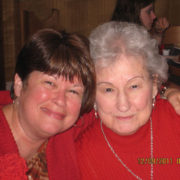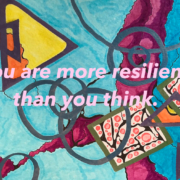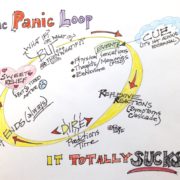I’m sorry. Estrangement is truly heartbreaking. The stories I hear on this topic are always heartbreaking, and include much ongoing, unresolved loss. The stories hold such longing for what could have been rich, healthy, and loving relationships. It happens between siblings, parents and children, and in-laws.
These are always stories about wretched boundaries and differing belief systems, from political parties to substance abuse, and to mental health disorders that disrupt even the possibility of “normal.”
The issues will often be generational as well, passed down in a chain that is among the hardest to break. I often tell clients that the very difficult work they are embarking on is heroic. It requires So. Much. Courage.
I’ll offer some examples of what this can look like.

The grief is powerful.
Estrangement Types
First is when parents of adult children simply cannot understand why their kids want nothing to do with them, or tend to keep their contact very limited. This often is the result of a couple of possibilities. Parents were emotionally abusive to their children and either won’t acknowledge this, or they do not have the personal insight to see it.
Second is when parents were substance abusers, or their children were/are, and no real help or cessation of the substance abuse has taken place. (Or there are many relapses.)
Third, the parents themselves suffered parental abuse and /or mental illness and it continues playing out in this generation, as mentioned in the beginning of this post. This can be emotional (bullying), physical, or financial. Or all three.
The financial abuse can go either way as a well, adult children continuing to depend on older parents for support due to their own mismanagement of money, or parents using money to manipulate their children to live where they want, or do what they want. Many may be asking for money when it is known it will be used for overspending (think Amazon), purchasing drugs, gambling, or simply living beyond one’s means. Saying no to this is often difficult to impossible for parents, especially if you fear being cut off from grandchildren. Any of these situations make estrangement heartbreaking.
An Exception
I will call out an important exception to this financial boundary as many generations have been living together for support of all kinds during this pandemic hell-scape we have all endured.
The most difficult piece of your work will be a truthful self examination of what your contribution was to the estrangement.
So What To Do?
This depends of course on whether you are the parent or adult child, and what your goals are for the relationship. If you are a survivor of painful, ongoing parental abuse, then it is up to you to decide exactly what kind and how much of a relationship you want with your parent(s). Anything (legal) you decide is worth working towards. Sometimes that can mean protecting your own children from potential abuse or neglect. And please get yourself a therapist to help process this!
If you are the parent your choices can feel more limited. If your adult child refuses contact, then you have no choice but to honor it. Of course you can work to keep the door open. Send holiday or birthday cards. Or the (very) occasional email of well wishes with a light report of your life—not too much detail please. Don’t overshare, or attempt to induce guilt. The most difficult piece of your work will be a truthful self examination of what your contribution was to the estrangement. And now we are back to how much courage this takes. Letting go of what you want, even just a little, can help ease the anxious longing you feel. Having a therapist to work through your grief may be helpful.
Work in your current life to do better, be better, in the relationships you have now. And don’t participate in any drawing up of sides to take among family members. That is destructive, and serves no purpose except perhaps to assuage your ego.
It’s A Tough Nut
At best, estrangement is a tough nut to crack. But it can be done if both sides are willing. It takes patience, truth-seeking, healthy boundary setting, and courage. And if all of this fails, and you have done the work, you will know you have given it your best shot. And that’s no small thing.
If you need help with this, please contact me here. Don’t go it alone. You’ll end up spinning your wheels, getting either more angry or more forlorn.











